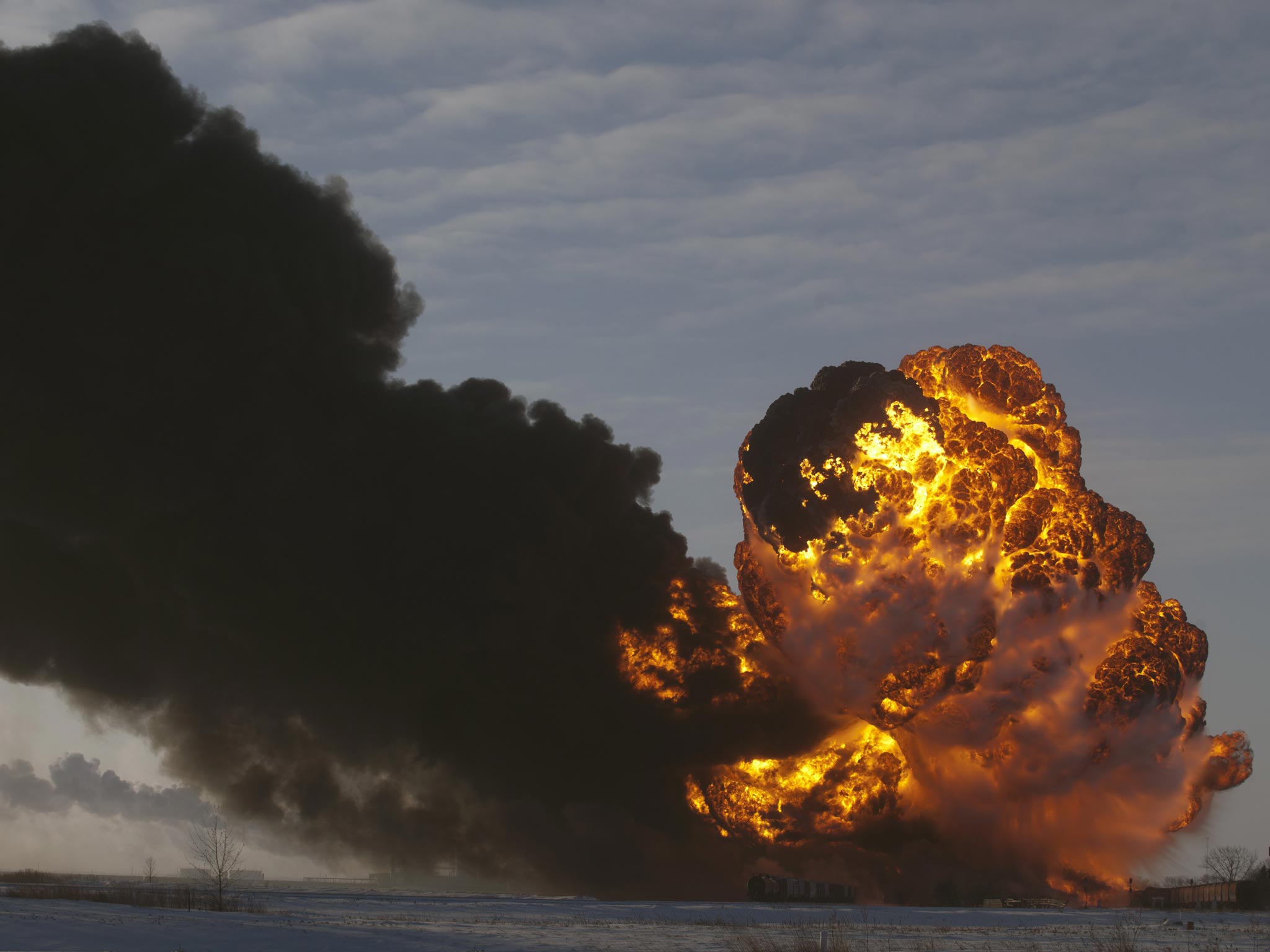North Dakota train derailment: Mile-long crude oil train hits second train causing massive explosions

Your support helps us to tell the story
From reproductive rights to climate change to Big Tech, The Independent is on the ground when the story is developing. Whether it's investigating the financials of Elon Musk's pro-Trump PAC or producing our latest documentary, 'The A Word', which shines a light on the American women fighting for reproductive rights, we know how important it is to parse out the facts from the messaging.
At such a critical moment in US history, we need reporters on the ground. Your donation allows us to keep sending journalists to speak to both sides of the story.
The Independent is trusted by Americans across the entire political spectrum. And unlike many other quality news outlets, we choose not to lock Americans out of our reporting and analysis with paywalls. We believe quality journalism should be available to everyone, paid for by those who can afford it.
Your support makes all the difference.Residents of a small town in North Dakota were urged to evacuate after a mile-long train carrying crude oil in North Dakota collided with another train on Monday, setting off a series of explosions that left at least 10 carriages ablaze.
It was the latest in a string of incidents that have raised alarms over growing oil-by-rail traffic.
Local residents heard five powerful explosions just a mile outside of the small town of Casselton after a westbound 112-car train carrying grain derailed, and an eastbound 106-car BNSF train hauling crude oil ran into it just after 2pm (20.00 GMT) on Monday, local officials said.
There were no reports of any injuries, but residents within 5 miles (8 km) of Casselton were urged to evacuate to avoid contact with the smoke and residents within 10 miles were asked to remain indoors.
A shelter has been set up in Fargo, about 25 miles (40 kilometres) away. Casselton has about 2,400 residents.
The sheriff's office said the National Weather Service was forecasting a shift in the weather that could increase the risk of potential health hazards.
"That's going to put the plume right over the top of Casselton," Cass County Sheriff Paul Laney said at a news briefing.
Investigators couldn't get close to the blaze about a mile (1.6 kilometres) outside of Casselton and official estimates of how many train cars caught fire varied. BNSF said it believes about 20 cars caught fire, but the sheriff's office estimated only 10.
The cars were still burning as darkness fell, and authorities said they would be allowed to burn out.
Authorities hadn't yet been able to determine exactly how the derailment happened, but BNSF spokeswoman Amy McBeth said the train carrying grain derailed first, then knocked several cars of the oil train off adjoining tracks.
BNSF said both trains had more than 100 carriages each.
The National Transportation Safety Board said Monday night it has launched a "go-team" to investigate the accident.
Ryan Toop, who lives about a half-mile (800 meters) away, said he heard explosions and drove as close as about two city blocks to the fire, which erupted on a day when temperatures were below zero Fahrenheit (minus 18 Celsius).
"I rolled down the window, and you could literally keep your hands warm," Toop said.
The derailment happened amid heightened concerns about the United States' increased reliance on rail to carry crude oil. Fears of catastrophic derailments were particularly stoked after last summer's crash in a Quebec town of a runaway train carrying crude from North Dakota's Bakken oil patch. Forty-seven people died in the ensuing fire.
The tracks that the train was on pass through the middle of Casselton, and Cass County Sheriff's Sgt. Tara Morris said it was "a blessing it didn't happen within the city."
Morris said it could take up to 12 hours before authorities could get close to the fire. About 80 of the cars were moved from the site. Jeff Zent, a spokesman for Gov. Jack Dalrymple, said the National Guard was on alert if needed.
Temperatures were forecast to drop to minus 20 F (minus 29 F) in Cass County overnight.
"Of course, Mother Nature, being North Dakota, it has to be one of the coldest nights of the year. It's deadly cold out there tonight," Laney said.
In the initial hours, authorities told residents to stay indoors to avoid the smoke.
Hannah Linnard, 13, said she was in the bedroom of her friend's house about half a mile (800 meters) from the derailment, wrapping late Christmas presents.
"I looked out the window and all of a sudden the train car tipped over and the whole thing was engulfed in flames and it just exploded. The oil car tipped over onto the grain car," she said. Hannah said she could feel the warmth even inside the house.
Terry Johnson, the manager of a grain dealer less than a mile (1.6 kilometres) from the derailment, said he heard at least six explosions in the two hours following the incident.
"It shook our building and there was a huge fireball," he said.
North Dakota is the No. 2 oil-producing state in the US, trailing only Texas, and a growing amount of that is being shipped by rail. The state's top oil regulator said earlier this month that he expected as much as 90 per cent of North Dakota's oil would be carried by train in 2014, up from the current 60 per cent.
The number of crude oil carloads hauled by U.S. railroads surged from 10,840 in 2009 to a projected 400,000 this year. Despite the increase, the rate of accidents has stayed relatively steady. Railroads say 99.997 per cent of hazardous materials shipments reach destinations safely.
Join our commenting forum
Join thought-provoking conversations, follow other Independent readers and see their replies
Comments